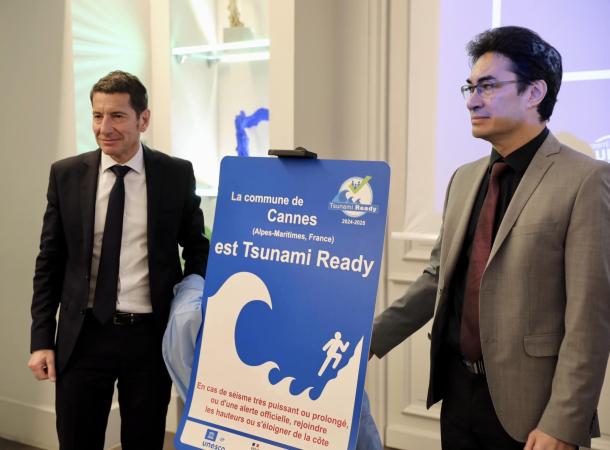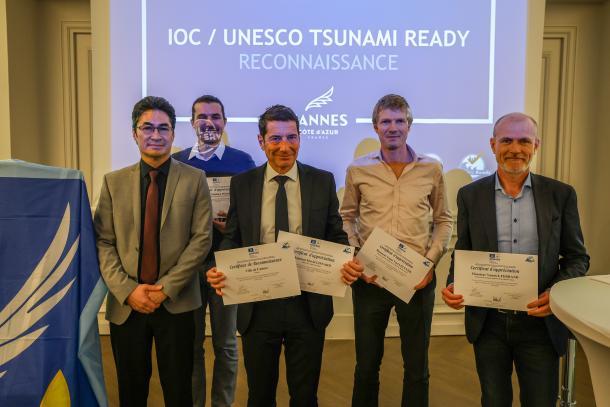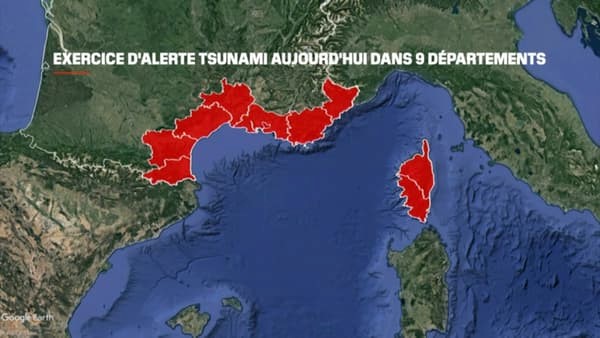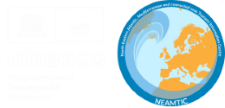Cannes Municipality Achieves Historic Recognition as UNESCO-IOC Tsunami Ready Community
In a groundbreaking achievement, the Municipality of Cannes (France) has been officially recognized as the first UNESCO-IOC Tsunami Ready community in mainland France and the Mediterranean. The momentous event unfolded on January 19, 2024, at the Salon Marianne at City Hall, marking a pivotal milestone not only for Cannes but for the entire region.

Mairie de Cannes
Cannes’ recognition by UNESCO follows the accreditation of France’s Centre d’alerte aux tsunamis (CENALT) as one of the five centres providing tsunami alerts in the North-Eastern Atlantic, the Mediterranean, and connected seas (NEAM) region since 2017.
Denis Chang Seng, Programme Specialist at UNESCO’s Intergovernmental Oceanographic Commission (IOC/UNESCO) in charge of coordinating early warning efforts in the NEAM region, emphasised the historical significance of the announcement: “Cannes Municipality becomes the first IOC/UNESCO Tsunami Ready Recognized Community in France and the North-eastern Atlantic, the Mediterranean, and the connected seas region.”
Mayor David Lisnard highlighted the municipality's commitment to anticipating and managing natural phenomena since 2014, with a specific delegation focused on limiting livelihood damage and, most importantly, preventing human losses.
The recognition ceremony, attended by representatives from major Cannes entities, saw key figures such as Mayor David Lisnard, Municipal Councilor Antoine Babu, Director General of Service Karin Topin-Condomitti, Deputy Director General Yann-Vari Lecuyer, Director of Major Risk Yannick Ferrand, and Paul-Valéry University Lecturer Matthieu Péroche being honoured with certificates of appreciation for their active contribution to the successful implementation of the Tsunami Ready Programme.

Mairie de Cannes
Cannes, exposed to various natural risks, including submergence and tsunami risks along its 15 km coastline, has actively prepared for years. The municipality's actions, including hazard assessments, evacuation mapping, drills, and exercises, align with the UNESCO Tsunami Ready 12 key indicators, demonstrating unwavering commitment to tsunami preparedness and community resilience.
In addition, the municipality and the Prefecture of Alpes-Maritimes organised a tsunami exercise to test the FR-Alert system in real conditions across nine French coastal departments. The exercise aimed to raise public awareness and evaluate the effectiveness of alerts sent to smartphones.

BFMTV
Cannes' global and innovative strategy, certified by the Ministry of Europe and Foreign Affairs since 2018, is an example of public policy oriented toward minimising risks and protecting citizens. The Tsunami Ready Programme, led by the Intergovernmental Oceanographic Commission of UNESCO, aims to protect all communities at risk, worldwide, from tsunamis by 2030. Beyond Cannes, the IOC/UNESCO is actively cooperating with several countries and partners to build resilience to tsunami risk globally.
Currently, the IOC/UNESCO is implementing the CoastWAVE project (funded by the European Commission’s Directorate-General for European Civil Protection and Humanitarian Aid Operations, DG-ECHO) in the North-eastern Atlantic, the Mediterranean, and connected seas region, with seven additional Tsunami Ready Recognized communities expected by June 2024 in Egypt, Cyprus, Morocco, Greece, Malta, Spain, and Türkiye.
***
About the IOC/UNESCO:
The Intergovernmental Oceanographic Commission of UNESCO (IOC/UNESCO) promotes international cooperation in marine sciences to improve management of the ocean, coasts and marine resources. The IOC enables its 150 Member States to work together by coordinating programmes in capacity development, ocean observations and services, ocean science and tsunami warning. The work of the IOC contributes to the mission of UNESCO to promote the advancement of science and its applications to develop knowledge and capacity, key to economic and social progress, the basis of peace and sustainable development.
About the Ocean Decade 2021-2030:
Proclaimed in 2017 by the United Nations General Assembly, the UN Decade of Ocean Science for Sustainable Development (2021-2030) (‘the Ocean Decade’) seeks to stimulate ocean science and knowledge generation to reverse the decline of the state of the ocean system and catalyse new opportunities for sustainable development of this massive marine ecosystem. The vision of the Ocean Decade is ‘the science we need for the ocean we want’. The Ocean Decade provides a convening framework for scientists and stakeholders from diverse sectors to develop the scientific knowledge and the partnerships needed to accelerate and harness advances in ocean science to achieve a better understanding of the ocean system, and deliver science-based solutions to achieve the 2030 Agenda. The UN General Assembly mandated UNESCO's Intergovernmental Oceanographic Commission (IOC) to coordinate the preparations and implementation of the Decade.









































